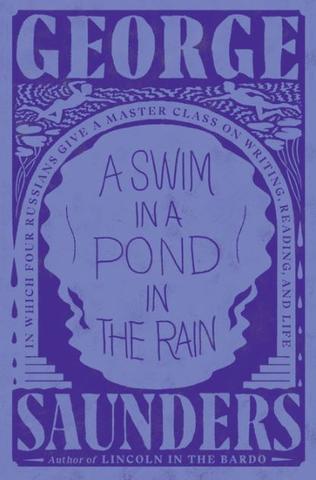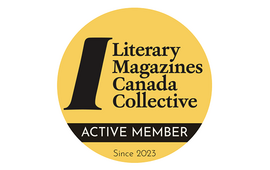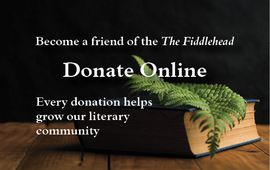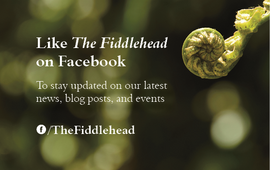
Nadja Lubiw-Hazard’s reading recommendation:
I was recently reviewing Virginia Woolf quotes, hoping to find a suitable prompt for the creative writing group that I facilitate, when I came across this one: “I am reading six books at once, the only way of reading; since, as you will agree, one book is only a single unaccompanied note, and to get the full sound, one needs ten others at the same time.” (From The Letters of Virginia Woolf: Volume Three, 1923-1928). I laughed and breathed a great sigh of relief at the same time, pleased to see I am not alone in my habit of reading multiple books at one time; I have bookmarks in at least seven right now. But I will rein myself in, and tell you about just one, which I recently finished: George Saunders book, A Swim in a Pond in the Rain: In Which Four Russians Give a Master Class on Writing, Reading, and Life.
This is one of those books that, once I started it, gave me a little jolt of anticipation each time I caught sight of its beautiful purple cover; I couldn’t wait to dive back in again. Saunders, who is a professor at Syracuse University and an award-winning American writer (I’ve added Lincoln in the Bardo to my very long to-read list, as I’ve never read any of his other work before), more than meets the promise of his book’s title with his enthusiastic, funny, thoughtful and engaging take on writing.
First, a bit about the Russians. I will confess two things: one, I had never read any of the authors featured in this book (Chekhov, Turgenev, Tolstoy, Gogol); and two, I was, at times, not as enamoured with the short stories as I was with Saunder’s analysis of them, but I appreciated the opportunity to read and think about them, and I was captivated enough by Tolstoy’s story “Master and Man” that I have added Anna Karenina to that ever-growing to-read list of mine.
Saunder’s master class on writing was illuminating, both in terms of how great art is created, and how readers respond to stories. I didn’t study writing or literature in university, so I have never been guided through such a detailed and rigorous analysis of what makes a short story work, and what makes it flawed; by the end of the book, I felt both incredibly inspired as a writer, and at the same time incredibly discouraged. Although I have moments when my writing feels right and true, and I know that I’ve written the best version of the story that I am able to, I realize that I am a long, long way away from mastering the art of writing fiction. Like many writers, I struggle with the disparity between the story that exists in my mind and the story that appears on the page. As Saunder says, reflecting on his own struggle as a writer: “It is less, less than we wanted it to be, and yet it’s more too – it’s small and a bit pathetic, judged against the work of the great masters, but there it is, all ours.”
Saunder’s writes, not just about what it is to write, but about what it is to be a reader. What is it that makes us want to read more? What is it that piques our curiosity and interest, satisfies us, makes us decide that something is good? As promised in the book’s title, Saunder’s discusses how art leads us to reflect on the deeper meaning of our lives. Towards the end of the book Saunders says: “Writing this book turned out to be a chance to ask myself again, at length: “Do you still want to devote your life to fiction?” After reading A Swim in a Pond in the Rain I echo Saunder’s answer to the question. Yes, I do.
Nadja Lubiw-Hazard is a writer and a veterinarian. She is the author of the novel The Nap-Away Motel. Her work has appeared in The New Quarterly, Room, Canthius, The Dalhousie Review, Understorey, and elsewhere. Nadja lives in Toronto with her wife, their two daughters, a black pug, and an old orange tabby cat. Her story A Good Dog is featured in the new Summer Fiction issue. Order your copy of the issue today!











Add new comment